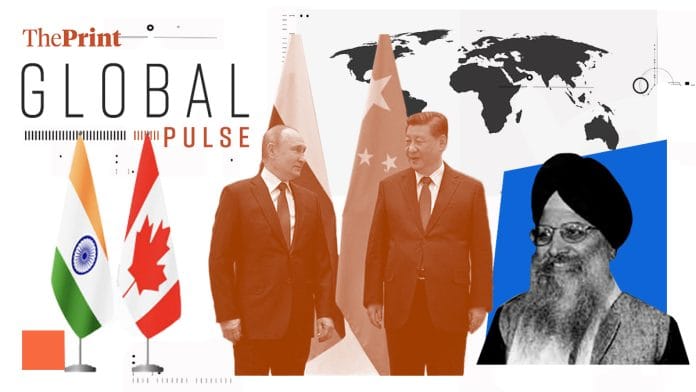New Delhi: The BRICS summit is opening up a “new chapter” in China-Russia ties, proclaims a Global Times editorial.
Xi Jinping and Vladimir Putin met for the third times this year in Kazan, and reportedly expressed concern over how the world is “undergoing profound changes unseen in a century”, according to Global Times. The “profound friendship between China and Russia, built on generations of mutual support,” however, will remain unchanged.
The editorial is also sure that this relationship will “enhance the practical cooperation of BRICS, injecting more stability and certainty into the turbulent global situation”. The editorial is highly worried about the “complex and turbulent international situation”, and maintains that a harmonious relationship between China and Russia is not just good news for the region, but for the world.
“It is important to emphasize that the China-Russia relationship is characterized by non-alliance, non-confrontation and not targeting any third party, which forms the foundation of cooperation between the two nations,” the editorial states. “In this sense, it can be said that while the BRICS mechanism is a non-Western cooperation framework, it is not an “anti-Western alliance”.
It is fundamentally different from “small circle diplomacy” like the G7 and the Five Eyes Alliance, the editorial says.
“Only those who still harbor Cold War mentality would view the independent and autonomous cooperation between China and Russia, as well as multilateral cooperation like BRICS, as a ‘counterattack against the West’. In fact, they have already fallen behind the times,” it continues.
It’s time for the rest of the world to catch up with the new global order, the editorial implies. And the BRICS summit is also the best platform for the “Global South to have its voice heard,” according to another Global Times piece.
Meanwhile, there’s more on the unfolding diplomatic spat between India and Canada.
Canadian media reported two stories over the past day: that Canadian officials fed intelligence about India to the Washington Post, and that the two killers of Ripudaman Singh Malik—who was acquitted of murder in the 1985 Air India Kanishka bombing—got into a fistfight in the courtroom after pleading guilty.
The Globe and Mail reports that National Security and Intelligence Adviser Nathalie G. Drouin and Deputy Minister of foreign affairs David Morrison “provided sensitive intelligence” about India days before the Canadian police publicly alleged that Indian government agents were linked to homicides, extortions and other violent criminal activities in Canada. This briefing was held in the week before Canada’s Thanksgiving, according to two sources.
The same report points out how this leak to an American publication is starkly different to how Trudeau reacted to leaks of classified information on Chinese activities.
So far, it’s only crickets from The Post: the publication hasn’t responded nor reported on the developments.
The Vancouver Sun also reports on the courtroom drama as two of Malik’s killers, Jose Lopez and Tanner Fox, got into an altercation right after pleading guilty to his murder. Mentioning Malik’s involvement in the 1985 bombing, the report does say that Malik had “changed his views on Khalistan” and spoken in favour of Modi.
“He had been at odds with Surrey Khalistan activist Hardeep Singh Nijjar, who was shot to death in June 2023 outside the Guru Nanak Gurdwara. Canada has said the Indian government had a role in the plot to kill Nijjar. Four Indian nationals have been charged in his death,” the report continues.
Also read: Global media says Modi will be comfortable with Trump, not Harris, as POTUS; sees ‘hope’ in LAC deal






